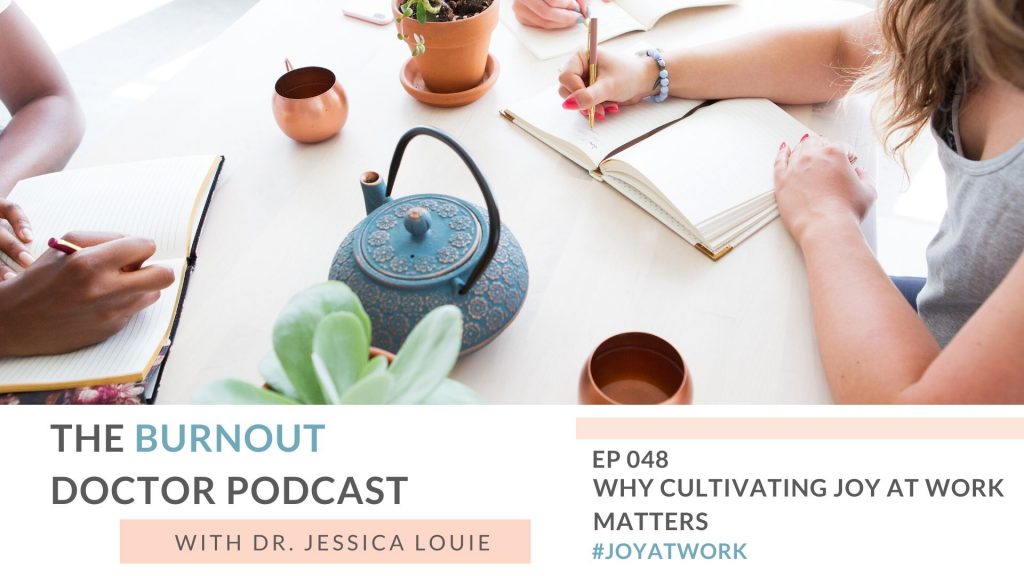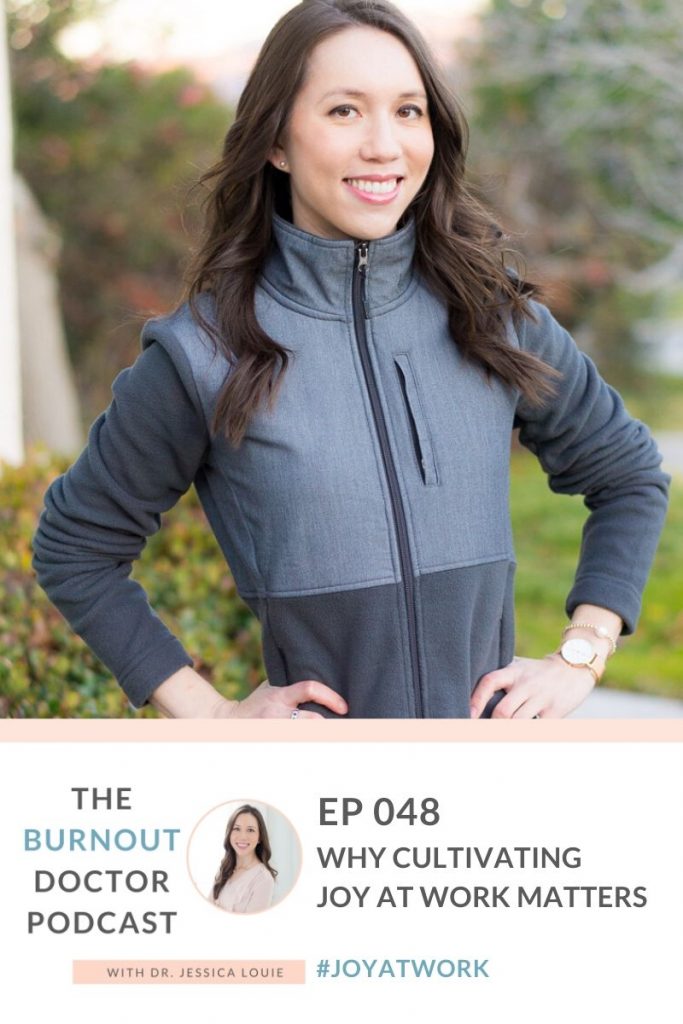
Episode 48: WHY does cultivating JOY at Work matter? What can we ask ourselves to see if we are currently bringing JOY at work into everyday life?
Listen to Podcast: Listen in new window | iTunes | Spotify | Stitcher
Subscribe: Apple Podcasts | Android | Email | Google Podcasts
Download Podcast Workbook
Mentioned on Ep 048: Why Cultivating Joy at Work Matters for work-life alignment and harmony
Welcome back to The Burnout Doctor Podcast, I’m your host Dr. Jessica Louie. On episode 48 today, we’re discussing WHY cultivating Joy at Work matters. This is perfect timing as we discuss my personal approach to this topic in combination with Marie Kondo’s new book with Scott Sonenshein, Joy at Work. You can also go back and listen to episode 31 on Joy at Home and Joy at Work.
Thank you for supporting our Spark Joy in Healthcare community and Pharmacist Care Packages. We sent over 1,200 care packages to pharmacists working on the front lines of the pandemic. See more information here.
I’m Certified in the KonMari Method and love bringing the KonMari Method into my teachings to simplify your life in healthcare.
What do we know about our work environments and Americans. Many of us know that clutter is negatively impacting our lives. My opinion on clutter and burnout is discussed in episode 8 on how clutter relates to burnout. You also know how clutter affected my own burnout story in 2015. In a study on adult Americans, 90% felt that clutter had a negative impact on their lives. The top reasons that clutter impacted their lives were: lowered productivity, negative mindset, reduced motivation and diminished happiness.
I’ve also alluded to a UCLA study before showing clutter adversely affects our health. Being surrounded by many things (aka physical clutter) increases cortisol levels in our bodies. Chronically high levels of cortisol can make people more susceptible to depression, insomnia, mental health disorders and stress-related physical disorders such as heart disease, hypertension (high blood pressure) and diabetes. We don’t want to be inducing these consequences because of the clutter in our work environments.
Psychology research has shown that messy environments taxes our brain function. When surrounded by clutter, our brains are so busy registering all the things around us that we can’t focus on what we should be doing in the moment, such as tackling work on our desk or communicating with others. Mental clutter impairs our ability to process information and make a decision. I call this brain clutter our mental overload or decision fatigue. One of our goals here at The Burnout Doctor Podcast is to decrease our mental load by simplifying.
We may have tried to declutter in the past but were not able to maintain it long-term.
Why do we have a vicious cycle of accumulating clutter?
There are two reasons why clutter is coming back into our lives. This is because clutter overwhelms our brains, making it harder to recognize, experience and savor the things that are most important to us – aka bringing us JOY. Second, when we are inundated with things, information and tasks, we lose our sense of control and ability to choose. This becomes a viscous cycle because when we are no longer capable of taking initiative or choosing our actions, we forget that work is a means to. Work is really a means to realizing our dreams and aspirations. When this happens, we lose our love for our job.
When we no longer feel in control (just like I talked about in my own burnout story), we’ll stat accumulating more unwanted stuff. For me, that was shopping for clothing and spending thousands of dollars. Then the guilt sets in for shopping to cope with stress or burnout. But we put off dealing with stuff indefinitely because we don’t feel in control and our brain is so overloaded to take a significant action step. Thus, we generate a vicious cycle of clutter.
Now, some of you not be bothered by clutter. You don’t mind a cluttered desk or a cluttered work station with papers all over it.
If think that cluttered desk helps with creativity, ask yourself:
- Are you honestly feeling positive about working here right now?
- Does working at this desk every day really spark joy for you?
- Are you sure you’re giving full scope to your creativity?
- Do you really want to come back to this desk tomorrow?
These 4 questions will help you determine if your desk and cluttered space is allowing you to bring joy and creativity into your life. Or is this clutter distracting you from joy at work.
Now moving onto our ideal work life. I talk about this in our Clarify step of our Clarify Simplify Align method. Let’s touch on this one more time. What is important to consider when assessing work-life alignment and harmony.
- Physical environment – what you see looks like
- Behavior – what you do there
- Feelings – what you feel when you do that
- Feelings are most important of the 3. If you do not feel you are bringing your best self to your daily work, then we want to take steps to bring that joy into work. This is important because there is a person or human being at the end of all this. For us in healthcare, that is a patient. For others, that’s are our team members, customers, clients, students. We FEEL joyful at work.
Joy at Work book by Marie Kondo and Scott Sonenshein – purchase here
If you’re struggling with this, I’m offering a cost-effective way to work together for accountability. My coaching program now offers 30-minute weekly sessions to check-in for accountability, reflect on progress, answer and guide you through difficulties. Apply now at DrJessicaLouie.com/coaching.
Until next time, spark joy my friends!
*If you enjoyed this topic, will you take a screenshot of this episode and share it on your Instagram stories and tag me in the post. I’ll re-share it on my own stories.If you haven’t already connected with me, I’m most active on Instagram and LinkedIn – send me a friend invite and tell me what podcast episode has been your favorite!
*Have you given our podcast a review on iTunes? Write us an honest review. This really has helped other pharmacists and healthcare professionals find this podcast, learn from it and grow our community together!
Note, my views are my own and are not associated or representative of my employer(s).
This podcast is for educational purposes only and not medical advice.
LIKE THIS POST? PIN IT!

